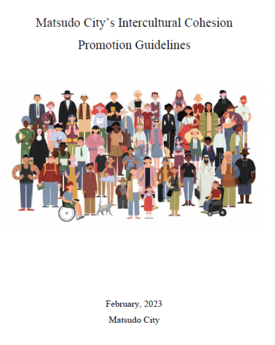Intercultural Cohesion 多文化共生
更新日:2025年5月23日
Matsudo City's Intercultural Cohesion Guidelines / 松戸市多文化共生のまち推進指針

In proportion to the increase in the number of foreign residents in Japan, Matsudo City (hereinafter referred to as "the City") has a record 17,791 foreign residents as of the end of October 2022, which is 3.57% of the total 497,433 foreign residents in Japan. Compared to 10,761 ten years ago, the number of foreign residents living in Matsudo City has increased 1.6 times and is expected to increase further. Therefore, it is necessary to strive for intercultural cohesion in which citizens can support each other regardless of nationality.
In order to present our philosophy and basic policies for promoting intercultural cohesion, the City formulated the "Matsudo City's Intercultural Cohesion Guidelines" in February 2023 to realize "intercultural cohesion" in which Japanese and non-Japanese citizens can learn, work, and live together in peace while recognizing each other's different values.
On the basis of these guidelines, we will continue to work to promote intercultural cohesion in cooperation not only with the local government, but also with citizens, civic groups and businesses.
![]() Matsudo City’s Intercultural Cohesion Promotion Guidelines (English)(PDF:3,999KB)
Matsudo City’s Intercultural Cohesion Promotion Guidelines (English)(PDF:3,999KB)
日本における在留外国人が増加していることに比例し、松戸市(以下、「本市」という。)においても、令和4年(2022年)10月末現在で過去最高の17,791人、総人口497,433人の、約3.57%にあたる外国人市民が生活をしています。10年前の10,761人と比較すると本市で暮らす外国人市民は、約1.6倍となっており、今後、さらなる増加が見込まれることから、これからは国籍等に関係なく、市民が共に支えあえる多文化共生社会を目指していくことが必要です。
本市では、日本人市民と外国人市民がさまざまな価値観を認め合いながら、共に学び、共に働き、共に安心して暮らすことができる「多文化共生社会」の実現を目指していくため、令和5年2月、「松戸市多文化共生のまち推進指針」を策定し、多文化共生推進への理念や基本方針を示すこととしました。
今後は、本指針に基づき、行政だけではなく、市民の皆様、市民団体、企業等と連携を図りながら、多文化共生推進へ向けて取り組んでまいります。
![]() 松戸市多文化共生のまち推進指針(日本語)(PDF:5,873KB)
松戸市多文化共生のまち推進指針(日本語)(PDF:5,873KB)
Guidelines for the Promotion of Intercultural Cohesion in Matsudo City Hall / 多文化共生庁内推進指針
The purpose of this policy is to promote intercultural cohesion within Matsudo City Hall in accordance with the "Matsudo City Comprehensive Plan" and "Matsudo City’s Intercultural Cohesion
Promotion Guidelines".
「松戸市総合計画」および「松戸市多文化共生のまち推進指針」に基づき、庁内における多文化共生を推進していくため、定めるものです。
![]() Guidelines for the Promotion of Intercultural Cohesion in Matsudo City Hall 多文化共生庁内推進指針(PDF:577KB)
Guidelines for the Promotion of Intercultural Cohesion in Matsudo City Hall 多文化共生庁内推進指針(PDF:577KB)
What is Intercultural Cohesion? / 多文化共生とは?
According to the “Study Group Report on the Promotion of a Intercultural Cohesion” from the Ministry of Internal Affairs and Communications, intercultural cohesion is defined as “people of different nationalities and ethnicities living together as members of a local community, while recognizing each other’s cultural differences and trying to build equal relationships.
総務省「多文化共生の推進に関する研究会報告書」によると、多文化共生とは「国籍や民族などの異なる人々が、互いの文化的な違いを認め合い、対等な関係を築こうとしながら、地域社会の構成員として共に生きていくこと」と記されています。
Collaborative project "Learning Support for Children whose Native Language is not Japanese / 協働事業「日本語を母国語としない子どものための学習支援」
City of Matsudo and ESCO (Educational Support for Children from Overseas), a certified NPO, are working together to provide "Learning Support for Children whose Native Language is not Japanese". We aim to develop a multicultural society where children with foreign backgrounds are not isolated and everyone in the community can live in peace.
本市と認定NPO法人外国人の子どものための勉強会は「日本語を母国語としない子どものための学習支援」を協働で実施しています。
外国にルーツを持つ子どもが地域で孤立しない、誰もが安心して暮らすことのできる多文化共生社会づくりを目指します。
Read more in Japanese / 協働事業「日本語を母国語としない子どものための学習支援事業」
Easy Japanese / やさしい日本語
“Easy Japanese” refers to Japanese used in everyday life that has been rephrased into simple words and sentences that foreigners can understand. It is not merely changing the words we use, but rather the use of easy-to-convey expressions that takes cultural differences of the other person into consideration. For further details,
click here (Easy Japanese)(PDF:1,692KB)
「やさしい日本語」とは、普段使われている言葉を、外国人が分かるように配慮した簡単な言葉や文章に言い換えた日本語のことです。単に言い換えるだけではなく、相手の文化の違いに配慮した伝わりやすい表現にしましょう。詳しくは
「やさしい日本語」(PDF:1,692KB)
"Easy Japanese" Presentation by Coordinators for International Relations (CIRs) / 国際交流員(CIR)による「やさしい日本語」のプレゼンテーション
In this video, coordinators for international relations (CIRs) of Matsudo City clearly explain the concept of “Easy Japanese.”
“Easy Japanese” refers to Japanese that has been rephrased into simpler words and sentences, with the consideration of foreigners' understanding in mind. For example, a Japanese phrase meaning "please evacuate" can become "please run away," and a phrase meaning "submit the document" can be changed to "turn in the paper." It is utilized in many situations, such as providing information during emergencies and helping with everyday communication.
The video introduces key points to keep in mind when using “Easy Japanese,” along with concrete examples.
For those who have an interest in intercultural cohesion at the local level or want to facilitate smoother interaction with foreign citizens, be sure to give the video a watch.
この動画では、松戸市の国際交流員(CIR)が「やさしい日本語」について分かりやすく説明しています。
「やさしい日本語」とは、外国人に分かりやすいように配慮した簡単な言葉や文章に言い換えた日本語のことです。例えば、「避難してください → にげてください」、「書類を提出してください → この紙を出してください」などに言い換えます。災害時の情報提供や日常のコミュニケーションなど、さまざまな場面で活用されています。
動画では、「やさしい日本語」を使うときのポイントについて具体例を交えながら紹介しています。
地域の多文化共生や、外国人との円滑なコミュニケーションに関心のある方は、ぜひご覧ください。
PDF形式のファイルを開くには、Adobe Acrobat Reader(旧Adobe Reader)が必要です。
お持ちでない方は、Adobe社から無償でダウンロードできます。


